Jubal is a sort of four sided lust affair full of jealousies and back stabbing and one man trying to stay true to a friend. Starring Glenn Ford as "Jubal, Ernest Borgnine as "Shep," Rod Steiger as "Pinky" and Valerie French as "Mae" the lust and loneliness drive a wedge into the group.
Slovenly, good hearted Shep has married Mae and taken her to his ranch. She is very unhappy and feels the need to try and seduce the men that come along. She draws a bead on Jubal early on much to the agitation of Pinky, who has had an affair with her. Shep found Jubal along the road and brought him home to nurse him. Jubal is grateful and is not doing anything to endanger that feeling. He is also well put off that Mae would do this.
Pinky becomes very jealous of Jubal when Mae's attention goes to him and he is made foreman of the ranch. Out of this arrangement comes a lie that will cost some lives. Pinky drives the story by using innuendo and Shep's jealousy in the hopes he can destroy everyone and have Mae to himself.
Along the way some Mormons stop on the land which gives Jubal a chance to help the group and finally fall in love with one of the girls there. The group plays an important part in the climax in their attempt to repay Jubal's kindness to them.
I read somewhere that this is based on Shakespeare but am unsure which play. A fine supporting cast includes Charles Bronson in a pleasant role where he befriends Jubal and Noah Beery, Jr. and Felicia Farr. Grand locations, good performances and some action to boot make this one, I think, worth a look.
I understand it played at the TCM Festival and wondered what any of the festival attendees thought, if they had a chance to see it.
Jubal
- movieman1957
- Administrator
- Posts: 5522
- Joined: April 15th, 2007, 3:50 pm
- Location: MD
Re: Jubal
I saw Jubal at the TCM film festival and loved it. I'm not much of a Glenn Ford fan but I loved his performance in it. His character is stuck in a very tough situation and he has to struggle to make the best of it, and yes, some really bad things happen. Also, the landscape and cinematography are beautiful.
This was a new print and Sony VP Grover Crisp attended and spoke about all the problems restoring the film. It was shot in Eastmancolor and had faded very badly plus there were scratches on the negative. They'd take it out every now and then and evaluate it for restoration, but until the advent of digital restoration, they were never able to restore the color to the desired level. Now with computer they were able to put the color to an acceptable level, and also paint out the scratches.
Ernest Borgnine also attended (and sat behind me, occasionally talking to someone -- for once I did not turn around and give the glare of death. If Ernest Borgnine wants to talk during a movie, he can talk himself blue -- it's OK by me.) :) He talked after the movie about how he got into films, how he got the role of Marty, and how much he liked making Jubal. And some other topics I sadly don't remember... there's probably a video of it on the TCM site. They shot video of everything at the festival. :)
This was a new print and Sony VP Grover Crisp attended and spoke about all the problems restoring the film. It was shot in Eastmancolor and had faded very badly plus there were scratches on the negative. They'd take it out every now and then and evaluate it for restoration, but until the advent of digital restoration, they were never able to restore the color to the desired level. Now with computer they were able to put the color to an acceptable level, and also paint out the scratches.
Ernest Borgnine also attended (and sat behind me, occasionally talking to someone -- for once I did not turn around and give the glare of death. If Ernest Borgnine wants to talk during a movie, he can talk himself blue -- it's OK by me.) :) He talked after the movie about how he got into films, how he got the role of Marty, and how much he liked making Jubal. And some other topics I sadly don't remember... there's probably a video of it on the TCM site. They shot video of everything at the festival. :)
- moira finnie
- Administrator
- Posts: 8024
- Joined: April 9th, 2007, 6:34 pm
- Location: Earth
- Contact:
Re: Jubal
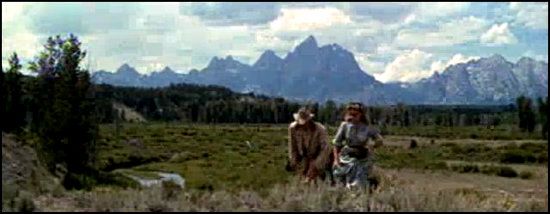
Above: Glenn Ford and Felicia Farr against the beauty of the West in Jubal (1956).
Jubal (1956-Delmer Daves) is being shown on Encore Westerns this month. I believe that the vivid print they are airing may be the restored version that Paula mentioned seeing above at the TCM Fest in 2010, though film purists with a technical streak may find the 35mm print somewhat dissatisfying, for reasons that are explained here and because it is being shown in a pan-and-scan mode. Filmed in Jackson Hole, Wyoming, it appears to be magnificent-looking to this movie peasant, leading me to almost smell the mountain air, the wild strawberries, cow patties, and meadow flowers that are captured in every wide-screen vista as photographed by Charles Lawton, Jr., who also worked on the two other Glenn Ford Westerns made with director Delmer Daves, 3:10 to Yuma (1957) and Cowboy (1958). Ford, who was reaching the apogee of his popularity in the '50s, told an interviewer near the end of life that "Del was a very fine director. I think the three films we did together hold up well, even today. You know, I can't tell you why we had good chemistry. He was always prepared and he knew what he wanted to achieve with a film. I owe Del a lot of credit in my goal to portray a real cowboy, not an actor pretending to be a cowboy. He saw potential in me and I hope I didn't disappoint him."
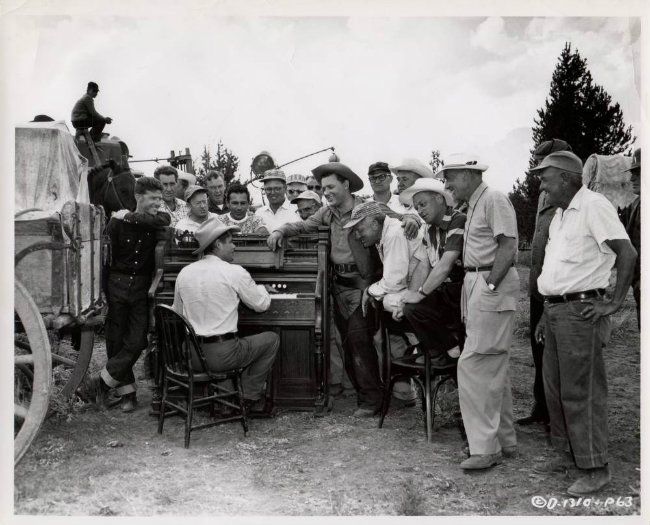
Above: On the set of Jubal, Glenn Ford playing a tune as Rod Steiger, with his arm around Delmer Daves (in plaid cap), looks on with many of the rest of the company.
When asked about the precise way that Daves made his movies, the actor, who admitted to his co-star Ernest Borgnine that he was a bit intimidated by the recent Oscar winner despite his own long list of credits, explained that "Nothing happened in a Delmer Daves film that wasn't intentional from the camera set-ups to the wardrobe. He was like Fritz Lang in that way. For some reason, and it has nothing to do with me, Jubal, 3:10 to Yuma, and Cowboy are probably the best Westerns I made. It could be the good stories but you've got to give Del a lot of credit. Jubal was a difficult script that Del wrote for [Columbia Pictures mogul] Harry Cohn. Harry really wanted to do this film. The story floated around Hollywood for over a decade, and Columbia put a lot of money into its development."
Delmer Daves, who lived among the Hopi and Navajo tribes as a young man, brought his considerable storytelling skills to some very fine, thoughtful Westerns as a result, among them Broken Arrow (1950) and The Hanging Tree (1959). As a big fan of all Daves' movies (even the teen "classics" of the '60s), I was eager to see this movie. I was drawn in by the storyline, as well as the way that Ford underplayed his quiet character, allowing the more florid characters around him to take center stage most of the time, but commanding attention by his stillness. As the story played out, the leading man also eventually displayed his adroitness with action sequences requiring him to draw a gun, and show his spine. Interestingly, there may have been something to Ford's feeling about Daves' ability to draw out his best acting. In some films, I have sometimes found Glenn Ford to veer between annoyingly boyish puppy-dog expressions (A Stolen Life, The Mating of Millie) and an occasionally impenetrable stolidness (parts of Gilda and Trial). In between some of those roles, when a really good director got his mitts on Ford, like John Cromwell in So Ends Our Night (1941), Joseph H. Lewis in The Undercover Man (1949), Fritz Lang in The Big Heat (1953) and more, the guy delivered some very good performances. I suspect that by the time Glenn Ford made these three Westerns with Delmer Daves the stars were aligned nicely, with the actor seasoned enough to give his best and Daves reaching the height of his powers as a filmmaker and a director who could elicit some of the best performances from his actors. There was also an element of just plain luck too.
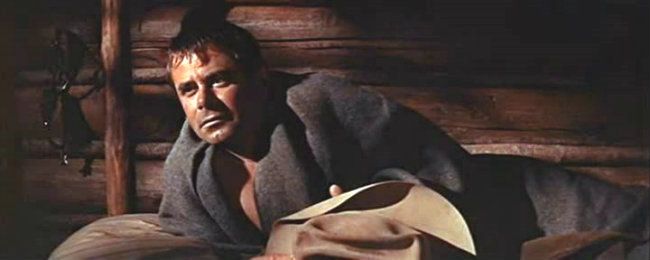
While I agree that the Jubal story is rooted in Othello, it seems to feature two Desdemonas, one seemingly pure and one apparently evil. I was also intrigued by the historical and spiritual references in the movie, particularly in the name of the central character, a drifter named Jubal Troop. That brings to mind the descendent of Cain mentioned in The Old Testament's Genesis as the somewhat "redeemed" inventor of musical instruments: "And his brother's name was Jubal: he was the father of all such as handle the harp and pipe. " Being an offspring of Cain is perhaps meant to reflect the rootless and forsaken nature of Ford's character, who begins the film as a "lost lamb" found in the wilderness and suspected of "being one of those lousy sheep herders." The name Jubal but might also have been an echo of the recent Civil War and some ties to the "Lost Cause" nature of that period, as a nod to the daring but ultimately defeated Confederate General Jubal Early. In the film, Ford is rescued by Shep Horgan, a ranch owner who is a good-hearted and generous man, (if not very bright) well-played by Ernest Borgnine.
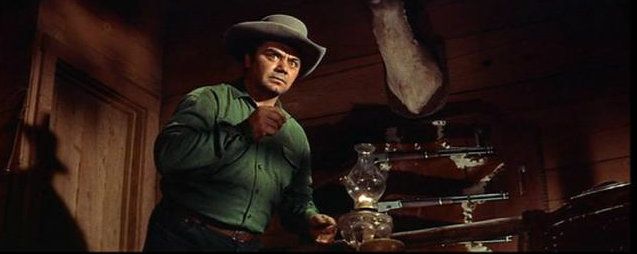
In addition to the ties to Shakespeare and the Bible, there are distinct ties to film noir in the stark depictions of the destructive power of female sexuality and a Biblical element to the story with the contrast between two kinds of love---the sacred (Felicia Farr as a dewy-eyed innocent Christian shepherdess in calico with flowing blonde hair) and the profane (Valerie French, dark and voluptuous, as a brazenly lustful, unfaithful woman manipulating the poor, poor men--and just "asking for it" as the saying goes). It is only as the film unfolds that my assumptions about the nature of Valerie French's status changed. Her insecure position is utterly at the mercy of the men around her. If she has made poor choices, perhaps it is due to her awareness of her physical and psychological vulnerability. Her often steamy and antsy portrayal of a "cat on a ranch house roof" elicited sympathy and displayed more than a bit of poignancy once we see her trapped humanity when she is confronted with the consequences of her actions first by her outraged husband, the dim, bullish Borgnine, and then an aroused former lover, "Pinky" Pinkham, played by Rod Steiger as a malcontent who is a scary but ham-fisted Methodized Iago.

Above: Valerie French tries to escape her "10,000 acres of loneliness" with Glenn Ford for a few moments in Jubal (1956).
In contrast, Felicia Farr, the daughter of a band of migrating Christians, is defined by her youth and the strong if slightly rock-ribbed spiritual beliefs of her father (played by veteran character actor Basil Ruysdael with a wary caution). Farr, who along with French was making her debut in this film, was lovely, and her simple goodness and virginal appeal to the Glenn Ford character was completely understandable. BTW, in Peter Ford's biography of his father, Glenn Ford: A Life, "Glenn's fondest memories of Jubal had to do with the young actress who played his love interest. 'Felicia was just lovely,' he recalled. 'Very pretty and smart. I was very fond of her. There was something between us, but let's just leave it at that. She married a great guy [Jack Lemmon], and I know they were very happy together." Farr would go on to appear in Daves' The Last Wagon (1956) and 3:10 to Yuma (1957), until she married Lemmon while he was appearing with Glenn Ford in another Delmer Daves film, Cowboy (1958). After her marriage, the actress only appeared in movies occasionally.
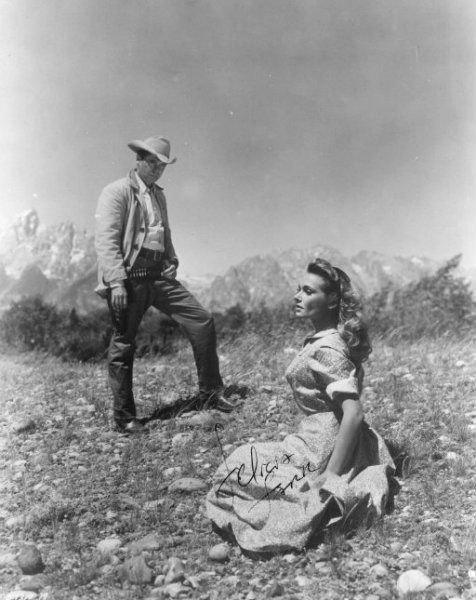
On reflection, some of the most interesting scenes in the film feature the interaction between the bullying Rod Steiger and Ford's taciturn drifter. Steiger's "Pinky" (would his character have been a happier guy if he could have shaken that nickname?) is a spoiler, cast aside by Valerie French, especially after she spies the new arrival, Jubal. Pinky lives to curdle every man's relationship with the ranch owner's unfaithful wife and with one another. I suspect that Rod really needed someone like Elia Kazan to rein him in, though his power in certain scenes is very effective, though other moments are too over-the-top. Maybe he was cast in this role due to his dangerously apt work as Judd in the recent film version of Oklahoma (1955). The contrast being the acting styles of the minimalist Ford and the brooding Steiger appears to have reflected their off-screen relations. Ford described Rod Steiger as "a fine actor but a real strange fellow. When I was a young actor I followed Spencer Tracy's advice, 'Learn your lines, hit your mark, don't bump into the props, and do the scene.' That's all a good actor needs to know in my opinion. 'Doing nothing well' is my definition of a good actor. One of the great misconceptions about this business is that you get in front of a camera and 'act.' That's the very thing an actor should not do. Be yourself--people need to identify with you. If they're not able to, you're in trouble."
With due respect to Ford, the ability of audiences to identify with a character on screen extended beyond the leading man, especially as morally complex roles began to be more realistic than traditional studio era archetypes in the '50s--even when it made audience members reflect on something that made them uncomfortable in their own nature. Steiger was among those who "dared to be bad" in extending this frontier of characterization.
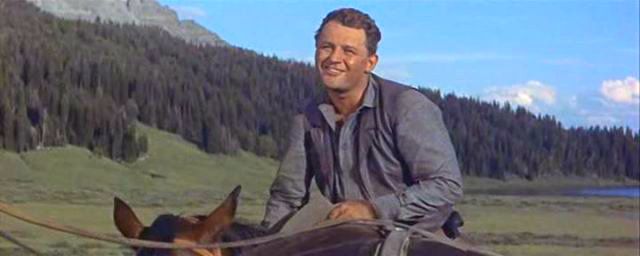
Above: Rod Steiger as the vicious "Pinky" in Jubal (1956).
Looking back on the experience years later, Glenn Ford concluded that "Rod...well, in kindness I think I should say he did a great job with his role. However, the "method" got a little too much for some of us, especially the wranglers. As a director, Del probably was in tune with Rod. Rod beat me at poker [off-screen]. I think Jack [Elam] and Rod had some kind of system going that they pulled on us, because I seldom lost at cards!...Look, Rod won an Academy Award, didn't he? And so did Ernie, so whatever Rod was doing in his role for Jubal probably worked for him. He was intense, I'll tell you that." Steiger was also very good at times, especially in his final scene opposite Valerie French, when he convincingly seethed with rage and pain. As an actor in only his sixth film, RS was still relatively new to films, which also may have contributed to his uneven performance illuminated with flashes of brilliance.
Fortunately, the film was graced by several great character actors, including Jack Elam, lantern-jawed Jack Dierkes, a very young Charles Bronson, and Noah Beery, Jr., as an endearing cowpoke who steals most scenes with just his shy grin...be still, my foolish heart. My only quibble about these stalwarts is that they are not given enough screen time, which is taken up by the leads and that gorgeous scenery.
This film is occasionally on cable, TCM, and is available on DVD.
Sources: Glenn Ford: A Life (Univ of Wisconsin Press, 2011) by Peter Ford, The Westerners: Interviews with Actors, Directors, Writers and Producers (McFarland, 2009) by C. Courtney Joyner.
- movieman1957
- Administrator
- Posts: 5522
- Joined: April 15th, 2007, 3:50 pm
- Location: MD
Re: Jubal
Thank you Moira. I wish I had your flair for this kind of essay but I'll be content to read your fine work.
Chris
"Time flies like an arrow, fruit flies like a banana."
"Time flies like an arrow, fruit flies like a banana."
- Rita Hayworth
- Posts: 10068
- Joined: February 6th, 2011, 4:01 pm
Re: Jubal
.
Movieman 1957:
I'm always saying things like that to moira. She writes so beautifully, there is really nothing to add. Lzcutter runs a close second to moira, although often I would say they are neck and neck. My reviews, on the other hand, need a lot of help, but I'm happy to try to get a discussion started.
One thing I might add is about Rod Steiger. He is one of filmdom's fiercest lowdown nasties, and I mean that in the very best way. I mean in films like this to light, frothy films like Oklahoma, he can stand alone as the films evil factor. Even his smile makes me cringe, and I sincerely mean that is a sign of fine acting. I like to DVR most things before watching them, and often FF through scenes with him in them after seeing it for the first time.
.
Movieman 1957:
I'm always saying things like that to moira. She writes so beautifully, there is really nothing to add. Lzcutter runs a close second to moira, although often I would say they are neck and neck. My reviews, on the other hand, need a lot of help, but I'm happy to try to get a discussion started.
One thing I might add is about Rod Steiger. He is one of filmdom's fiercest lowdown nasties, and I mean that in the very best way. I mean in films like this to light, frothy films like Oklahoma, he can stand alone as the films evil factor. Even his smile makes me cringe, and I sincerely mean that is a sign of fine acting. I like to DVR most things before watching them, and often FF through scenes with him in them after seeing it for the first time.
.
Anne
***********************************************************************
* * * * * * * * What is past is prologue. * * * * * * * *
]***********************************************************************
***********************************************************************
* * * * * * * * What is past is prologue. * * * * * * * *
]***********************************************************************
